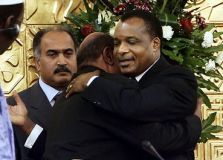Rights groups welcome withdrawal of Sudan’s bid for AU chairmanship
Jan 25, 2006 (KHARTOUM) — Sudan’s decision to withdraw its bid for the leadership of the African Union (AU) has been welcomed by human rights groups and local activists, who say it has enhanced Africa’s reputation.
 The two-day summit of Africa’s leaders, which ended Tuesday, was dominated by debate over Sudan’s bid for the prestigious job.
The two-day summit of Africa’s leaders, which ended Tuesday, was dominated by debate over Sudan’s bid for the prestigious job.
“I think it’s a wise decision by the Sudanese leadership,” Nhial Bol, editor of Sudan’s independent daily newspaper, the Citizen, told IPS in an interview in the capital Khartoum. “It was going to undermine the peace talks between the Darfur rebels and the Sudanese government in Abuja.” Talks between the rebels and the Sudanese government have stalled in Nigeria’s capital, Abuja, over claims of violations of ceasefires and by Khartoum’s decision to bid for the rotating chairmanship of the 53- member body.
Before the summit opened Jan. 23, the rebels had urged the AU to relocate the conference elsewhere in Africa. They fear Khartoum would use its new position, if elected, to cover up allegations of atrocities being committed by its army and pro-government Arab militia called the janjaweed in Darfur. The janjaweed have been accused of killing, rape and looting.
More than 200,000 people have been killed and over two million displaced since the conflict between the black rebels in Darfur and the Arab-dominated regime in Khartoum erupted in 2003.
Asked whether Sudan pulled out of the AU race because of the allegations of human rights abuses in Darfur, Zahawi Ibrahim Malik, Sudan’s information minister, told journalists Tuesday: “No. Some quarters hostile to Sudan prevented it from getting the chairmanship.” He did not elaborate.
U.S. President George Bush had Monday expressed concern about Sudan’s bid for the top AU job. Fugitive Osama bin Laden, accused by the United States of masterminding the Sept. 11 terror attacks on New York and Washington in 2001, lived in Sudan between 1991 and 1996.
Sudan became a haven for Islamic militants after a pro-Islamic junta, led by President Omar Hassan al Bashir, seized power in a military coup in 1989. Among those who grabbed the opportunity to relocate and live in the Sudan was Ilich Ramirez Sanches, internationally known as Carlos the Jackal. He was turned over to French agents and extradited to Paris in 1994.
Sanches, a Venezuelan national, is now serving a life sentence in France for a series of bombings and hijackings in Europe in the 1970s and 1980s.
Sudan remains on Washington’s list of countries accused of sponsoring terrorists. Efforts to remove its name from the list has not been successful, although Khartoum tried to use the north-south peace deal it clinched last year with southern rebels as a bait to persuade Washington to end its embargo. The sanction, slapped by Washington, prevents U.S. companies from doing business in Sudan.
Sudan’s bid for the AU chairmanship had split Africa down the middle. The issue was resolved only after a panel of AU, comprising Gabon, Zimbabwe, Burkina Faso, Djibouti and Egypt -representing Africa’s five regions -was formed to find a solution.
By Tuesday Sudan announced that a consensus had been reached for it to get the chairmanship in 2007. Sudan chaired the Organisation of African Union (OAU), AU’s predecessor, in 1978.
Asked about Sudan’s prospect of getting the chairmanship in 2007, Bol said: “Next year is next year. Anything can happen. Sudan’s bid could be subject to ending the conflict in Darfur.”
But President Bashir said he valued hosting the summit more important than holding the chairmanship.
“Sudan made the decision because we don’t want a split in the AU. Our objective is to get the (African) people together and face the challenges ahead,” Bakri Mullah, head of the Sudan’s External Information, told IPS in an interview. “A split in the AU is not in the interest of the Sudan.”
North Africa and east Africa initially backed Sudan’s candidacy. While west and central Africa refused to support Sudan. Southern Africa was split with president Levi Mwanawasa of Zambia and Festus Mogae of Botswana said to be supporting west and central African positions.
In his acceptance speech Tuesday, the new AU chairman Denis Sassou Nguesso of Congo-Brazzaville said he would tackle famine, poverty and HIV/AIDS which is devastating Africa. He has replaced Olusegun Obasanjo of Nigeria, the outgoing AU chairman. “I think it’s a good decision by Sudan to bow out of the race,” Bol said. “AU was going to die.”
“If they voted for Bashir, the casualty would have been Darfur and the people of Africa,” Reed Brody of the New York-based Human Rights Watch told IPS in an interview in Khartoum. “AU’s credibility would have been at stake.”
(IPS)
